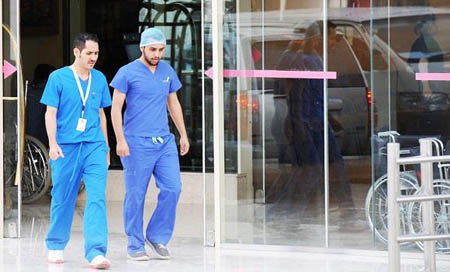 Riyadh, Apr 15: Five more MERS cases, including one fatality, were reported in Jeddah on Monday. An official from the Ministry of Health said the latest victim was a 70-year-old expat living in the Western Province.
Riyadh, Apr 15: Five more MERS cases, including one fatality, were reported in Jeddah on Monday. An official from the Ministry of Health said the latest victim was a 70-year-old expat living in the Western Province.
“Three citizens and a 56-year-old foreign worker have also been affected by the virus; their condition is said to be stable,” the official said.
The three Saudis who were infected were in their early 50s and are being treated at the ICU of a local hospital, while the other two, aged 28 and 45, are undergoing clinical tests.
Sources said at least 30 paramedics in Jeddah have been infected over the past week, four of whom are in the ICU. There is a huge demand for masks and gloves at pharmacies.
A laboratory tested around 190 suspected samples on Monday and only five were found positive, the official said.
Meanwhile, private schools in the capital have alerted their teachers to look for children showing symptoms of MERS and quarantine them promptly.
Insurance companies have refused to cover MERS cases. Abdul Kareem Al-Tamimi, a member of the health insurance committee at the Jeddah Chamber of Commerce and Industry, said international organizations have classified MERS as an infectious disease.
“Insurance companies deal with infectious diseases like natural calamities and will not cover them,” he said. “The cost of health insurance is expected to reach SR15 billion this year, a five-percent increase since 2013. Several service providers will incur losses.”
However, an insurance specialist, who requested anonymity said that insurance companies could cover MERS cases in coordination with the ministry and reclaim the extra costs incurred from the government.
“Epidemic cases are generally covered by the government since it will take measures to prevent the spread of the disease,” he said.
The Kingdom has reported 194 cases of MERS since September 2012, with the death toll reaching 69 on Monday.





Comments
Add new comment